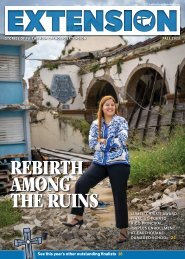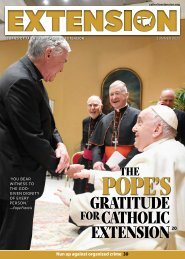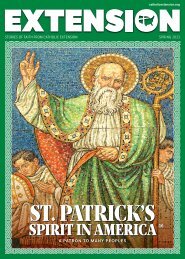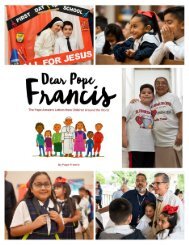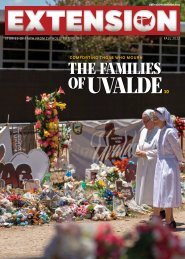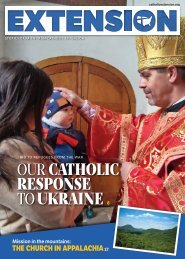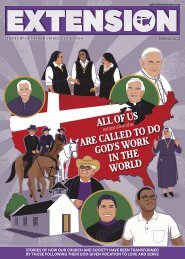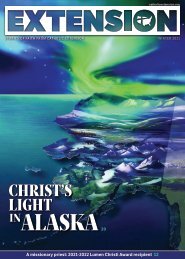Cardinal Michael Czerny, S.J., Message on Migrants
Many thanks to Cardinal Michael Czerny, S.J., the Holy See's Under-secretary for the Dicastery for Promoting Integral Human Development, for his presentation to the bishops of Extension-supported dioceses.
Many thanks to Cardinal Michael Czerny, S.J., the Holy See's Under-secretary for the Dicastery for Promoting Integral Human Development, for his presentation to the bishops of Extension-supported dioceses.
Create successful ePaper yourself
Turn your PDF publications into a flip-book with our unique Google optimized e-Paper software.
absence of unjust c<strong>on</strong>straints and absence of threat, which are addressed by welcome and protect,<br />
In the famous formulati<strong>on</strong> of Erich Fromm, those have to do with “freedom from.” This is<br />
completed by “freedom to”, that is, the c<strong>on</strong>diti<strong>on</strong>s under which humans can blossom and<br />
flourish.<br />
You have probably supported this sort of promoti<strong>on</strong> within your Dioceses: programs designed to<br />
help kids and adults to develop themselves, to achieve more in their educati<strong>on</strong> and work. It<br />
applies to migrants too, beginning with the right to migrate in times of need. As St. John XXIII<br />
stated in Pacem in Terris, “am<strong>on</strong>g man's pers<strong>on</strong>al rights we must include his right to enter a<br />
country in which he hopes to be able to provide more fittingly for himself and his dependents. It<br />
is therefore the duty of State officials to accept such immigrants and—so far as the good of their<br />
own community, rightly understood, permits—to further the aims of those who may wish to<br />
become members of a new society.” That is, the aim of flourishing for <strong>on</strong>eself and <strong>on</strong>e’s family<br />
must be accommodated or promoted, not blocked.<br />
The undeniable right of every human being to pers<strong>on</strong>al development calls for the promoti<strong>on</strong> of<br />
integral human development — the fullest development of each pers<strong>on</strong> and all people, allowing<br />
them to become active agents of their own development. In the case of migrants and refugees,<br />
this applies in countries of origin as well as places of transit, and destinati<strong>on</strong>. Before the right to<br />
migrate, states should guarantee the right not to have to migrate. All people must have the right<br />
to remain in their homelands, living lives of dignity, peace, and security. This might be relevant<br />
to your Diocese. Are some people leaving or thinking of doing so? How can we make the local<br />
community a place of real flourishing such that our people d<strong>on</strong>’t chase off after ‘the bright city<br />
lights’ and ‘the streets paved with gold’ elsewhere?<br />
4) Finally, to integrate is both the fourth and the ultimate moment in the process. We all know<br />
what it means. A pers<strong>on</strong> who is truly integrated feels completely included; social distance has<br />
disappeared, psychological barriers have dissolved. As Americans, you know the immense<br />
importance of integrati<strong>on</strong> and the c<strong>on</strong>tinuing tragedies of segregati<strong>on</strong>. Whether we’re talking<br />
about people within this country striving for acceptance and fair opportunity or about newcomers<br />
seeking a better life, let us admit that if we welcome, protect and promote, the job is not finished.<br />
The last step is the beautiful but slow process of going from “them” to “us”, from dependents to<br />
full participants, from ‘objects’ of our generosity (or even legal resp<strong>on</strong>sibility) to fellow-citizens<br />
and, indeed, fellow-“integrators” to others.<br />
Another dimensi<strong>on</strong> of integrati<strong>on</strong> is mutual enrichment. Without our paying attenti<strong>on</strong> to it,<br />
integrati<strong>on</strong> is always a two-way process, based <strong>on</strong> openness, <strong>on</strong> appreciative encounter, and<br />
recogniti<strong>on</strong> of the other’s spiritual and cultural richness. It’s that marvelous two-way movement<br />
from knowing about <strong>on</strong>e another, to actually knowing <strong>on</strong>e another; from helping other people<br />
5





